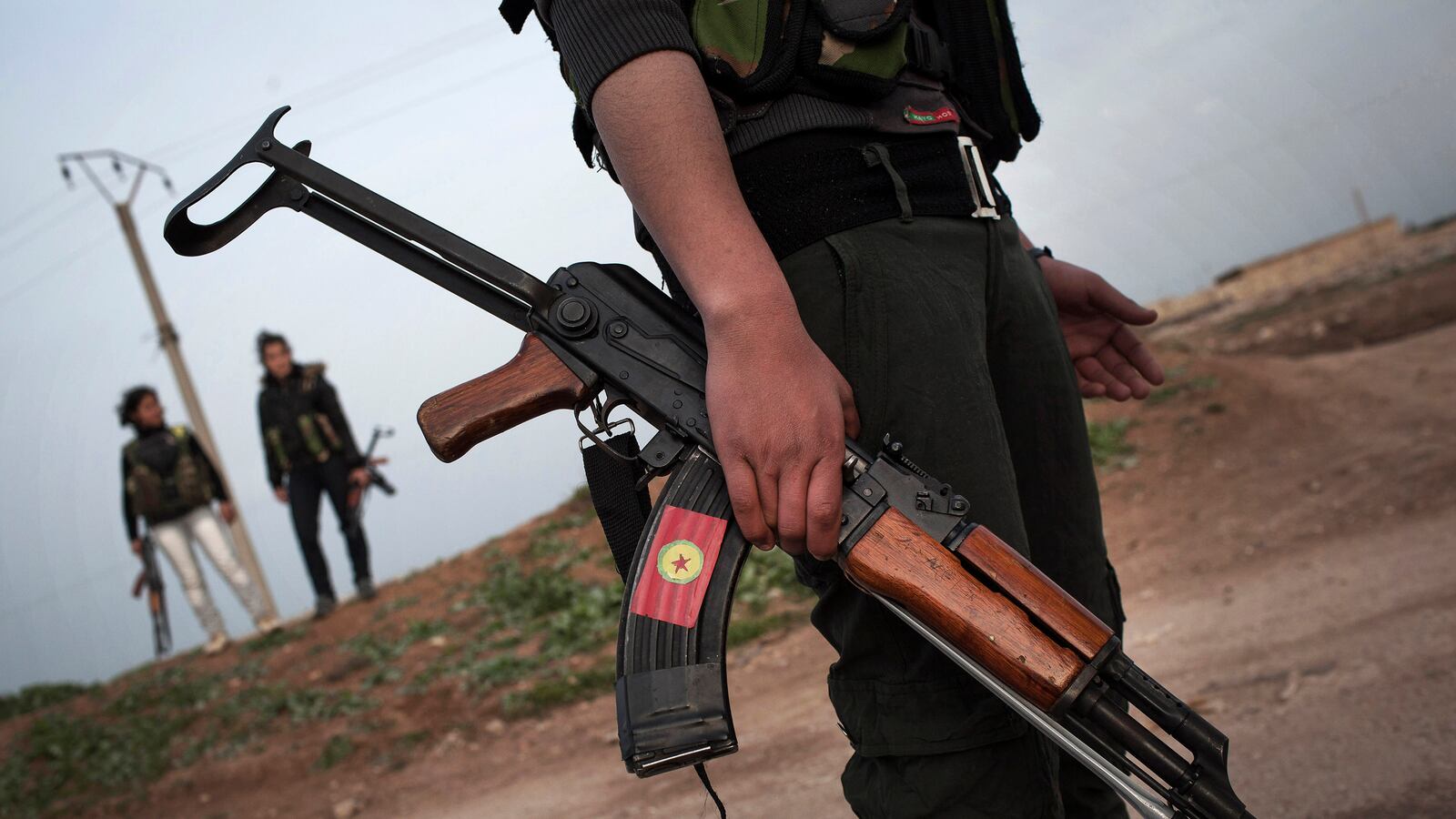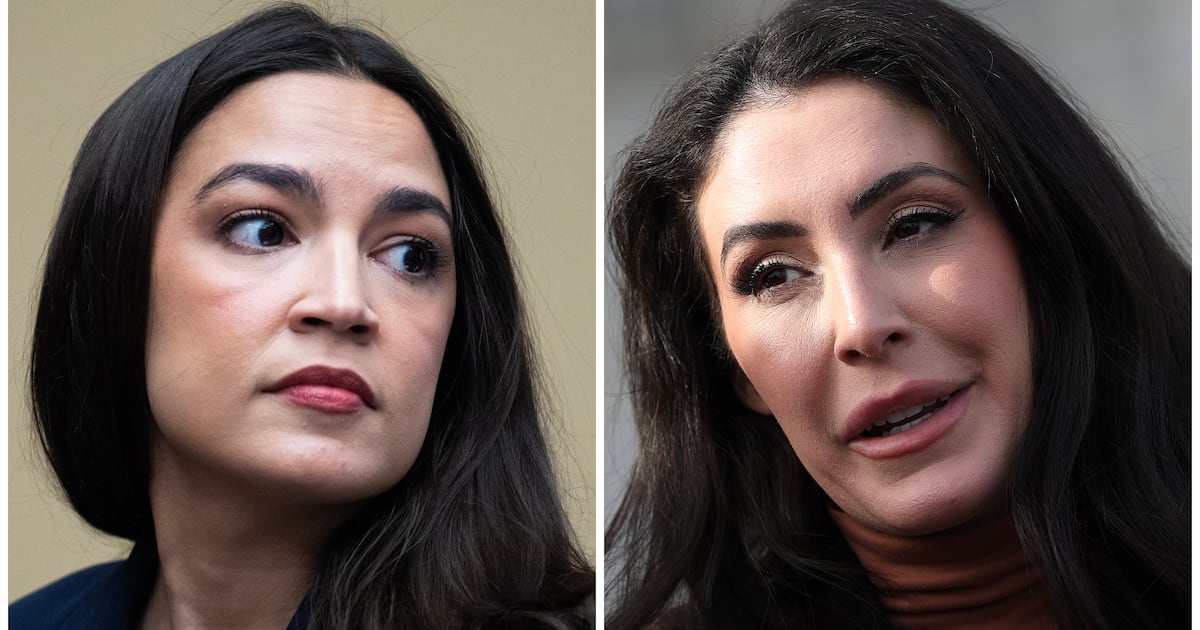The day before Syrian soldiers tried to seize me in Qamishli, the capital of the Kurdish-dominated northeast of Syria, one of the Kurds’ top military commanders explained to me there is a “balance of power” between the forces of President Bashar al-Assad and the Kurds, who last month announced they intend to set up their own regional government in territory abutting Turkey and Iraq.

“There is no peace between us and the Assad regime,” said Giwan Ibrahim. We were standing just a few city blocks away from where the cold war between the Kurds and Assad’s soldiers nearly turned hot, less than 24 hours later, during an armed standoff over my fate at a junction in the downtown Souk district.
The tense face-off last Thursday seemed in some ways uneven: The Syrian soldiers, who had been looking for me, were large, barrel-chested, and thick-necked members of Assad’s minority Muslim sect, the Alawi, a Shiite offshoot. They were from the Interior Ministry. The Kurds, from the volunteer police, or Asayis, were shorter and thinner. It was a quarrel between super-heavyweights and bantams.
“The Assad regime knows we are strong, so it chooses not to attack us now. And we choose not to attack Assad now, despite the fact that he is not our friend,” Ibrahim, the local chief of the volunteer police, had told me during a long interview at his headquarters. I thought of his words as I sat on my backpack on the side of the street, protected by a half-circle of Kurds seeking to stop the Syrians from bundling me into a truck. I hoped that would be the case now—that the fragile, uneasy peace between the two sides wouldn’t be shattered by gunfire.
One of the stories I had in mind to explore, after being smuggled earlier in the week into Syria’s Kurdistan with three companions—a fellow American reporter, a Turkish photographer, and an Egyptian doctor—was the Kurds’ insistence that they are not in cahoots with Assad.
The Syrian president withdrew his forces from a large swath of Syria’s Kurdistan early in the civil war, and since then the Kurds have grown in confidence and ambition, organizing a parallel system of government and establishing defense committees under the umbrella of the People’s Defense Units, or YPG. The lack of open conflict with Assad has prompted the charge that the Kurds are in league with the Syrian government.
The previous week, Fuad Hussein, the chief of staff of Iraqi Kurdistan’s president, Masoud Barzani, told me the Syrian Kurds were dancing to Assad’s tune. It is a claim that infuriates the Syrian Kurds and Kurds in Turkey. As far as they are concerned, Barzani is merely looking out for himself and is motivated by a fear that a Syrian breakup could impact badly on his semi-autonomous state by disrupting his rapprochement with Turkish Prime Minister Recep Tayyip Erdoğan, wrecking a series of proposed energy deals with Turkey.
A senior member of Turkey’s separatist Kurdistan Workers Party, or PKK—the sister party of the dominant Syrian Kurdish group, the Democratic Union Party, or PYD—told me just before I crossed that the Kurds shouldn’t be on any side in the Syrian civil war except their own. “This is not our war; our war is to protect our geography, and as the conflict in Syria becomes increasingly one between Sunnis and Shiites, it becomes even less of our fight,” Mahmoud said.
Western-backed rebels in the Syrian National Coalition also maintain that the Kurds are aligned with the Assad government and serving its interests. Earlier this month, a self-rule declaration by the PYD earned a sharp rebuke from the Syrian National Coalition, which announced it now considers the PYD and other Kurdish factions “hostile to the Syrian revolution.”
The SNC added: “The declaration of self-rule amounts to a separatist act, shattering any relationship with the Syrian people, who are battling to achieve a free, united, and independent state.”
The Kurds, as ever, don’t fit into the global political agenda of any of the major players—the West, the Gulf Arabs, and certainly not the Turks, who don’t want yet another Kurdish statelet sitting on their borders, possibly encouraging their own Kurds to push for semi-separatism again.
For those who want neatness, the Kurds are an annoyance. And for the mostly Sunni Muslim rebels battling Assad, the Kurds’ self-focus is indeed a betrayal, a weakening of an uprising.
In the wake of being dubbed enemies of the revolution, the Kurds now fear that more Islamist militias will join al Qaeda affiliates Jabhat al-Nusra and the Islamic State of Iraq and Sham, or ISIS, in fighting them. In recent weeks the Kurds have notched up an impressive string of victories over the jihadists. In late October they seized from the jihadists the town of Ras al-Ayn, on the border with Turkey, and recently they captured the strategic Iraqi border crossing of Yaroubiya, where locals say al-Nusra beheaded two men for having previously served in the Syrian military.
“The rebels attitude towards the Kurds is the same as the regime—they deny our identity and say we are all Syrians,” says Mohamad Kamal, a senior PYD leader who served 20 years in jail in Turkey for membership in the PKK. The increasing Islamist nature of the uprising isn’t something that appeals to the Kurds, either.
Kamal, like Ibrahim and the PYD leader Saleh Muslim—who is unable to enter Syria’s Kurdistan and is in exile in Europe—argue their strategy isn’t pro-Assad and that what they are seeking to do is to craft a semi-autonomous Kurdistan while avoiding the destruction that has befallen Aleppo and other towns and cities rebelling against the government. “We don’t want to let him come and destroy our cities so Qamishli, for example, would be razed like Aleppo,” says Ibrahim.
That doesn’t mean the Kurds won’t defend themselves or allow the Assad forces that remain in Qamishli to do as they like, including grabbing a foreign journalist. Little did I know that I would learn firsthand how Syria’s Kurds are in no mood to kowtow to anyone, whatever the costs. Their readiness to defend their geography and their “guests” saved this correspondent from spending a grim Christmas in an Assad jail in Damascus, and the Kurds appeared prepared to risk a full-scale confrontation to ensure my safety.
When Syrian soldiers from the Interior Ministry roared up in a white Toyota van to abduct me, I was startled. I had just returned to a vehicle to retrieve my backpack. I knew Syrian soldiers were based just a couple of blocks away, but the afternoon before I had been in the same district, which was within the 80 percent of the city controlled by the Kurds, and so I didn’t think I was in any danger.
Like many journalists who have had friends killed or abducted during the 33-month Syrian civil war, I have avoided entering the rebel-controlled northern Syrian provinces of Aleppo or Idlib since last winter because the risks are just too high—from sudden indiscriminate aerial attack by Assad’s warplanes to the high chance of being kidnapped by jihadists or criminal groups.
Nearly 20 foreign journalists are missing in Syria. Last week was the gloomy anniversary of the abduction of a fine young American journalist, James Foley, and he was on my mind when I entered Syria’s Kurdistan. I took the view that though dangerous, there is a greater clarity in terms of the disposition of forces in Syria’s Kurdistan than in other northern Syrian areas. Ordinary Kurds had been delighted to encounter a foreign journalist, and maybe my guard was down.
The Syrians who jumped out of their van ignored my Kurdish driver and translator, and made an immediate beeline for me, demanding my passport and lunging at my pack. I knew I had to delay being manhandled into their van somehow and hope rescue would arrive.
Also, I thought, I would soon find out whether the Kurds are serving Assad’s interests.
No one knew I was planning to go to the Souk district again: I had changed plans at the last minute and should have been heading to Ras al-Ayn. So I discount that this was a staged event—the anger and tension of the confrontation would also undermine that idea. I hoped my translator, who had scuttled off, would raise the alarm. I learned later that a concerned bystander who had run to the nearest Kurdish police barracks three blocks away was the first to inform the YPG of my predicament.
As I tried to use the open door of the vehicle I had been traveling in and the narrow spaces between parked cars to keep away from the two massive Syrian soldiers who confronted me, I saw in the corner of my eye about a dozen armed Kurds walking briskly down the streets toward us, yelling at the Syrian soldiers, who were quickly reinforced by others. The Kurds took up position in front of me, their AK-47s at the ready.
Some Syrian soldiers moved closer to me, too.
The leaders of the two sides started to argue, and they moved minutes later upstairs to a first-floor office above shops where my Egyptian companion had sought sanctuary. There a shouting match ensued, apparently with the Syrian commander saying I had entered Syria illegally and should be jailed. I was, he said, writing bad things about Assad, no doubt, and was a threat to Syria.
A crowd started to gather in the nearby streets to watch the standoff, though bystanders kept their distance and seemed ready to turn tail in the event bullets started to fly. About half an hour passed. The Kurds flashed me reassuring smiles occasionally; the Syrians maintained their menacing looks and in a mixture of broken English and Arabic shouted questions.
Chain-smoking and sitting on my backpack as quietly as I could, I feigned ignorance, trying to pretend this was nothing more than a misunderstanding or some mixup over something as minor as an unpaid parking ticket. It wasn’t how I felt inside.
Eventually the various commanders returned. There were smiles—although thin ones. “What are you publishing about Syria,” a bald-headed Syrian demanded. “Just about al-Nusra,” I responded innocently. “That’s good. Syrians and Kurds are friends against al-Nusra, he said, adding, “Tell America, we love Americans but Obama, NO.”
The two sides disengaged, with about 16 Syrians clambering back in their assortment of trucks and the Kurds walking me back to their barracks. There I learned there had been intense negotiations at different levels and the whole standoff was passed up to a judge, Abu Shaban, who is used to adjudicate disputes between the Syrians and Kurds.
He told the Syrians apparently that traditional rules of hospitality demanded the Syrians back off and warned them that the Kurds wouldn’t surrender me without a fight and that they risked escalation and the fragile peace ending.





